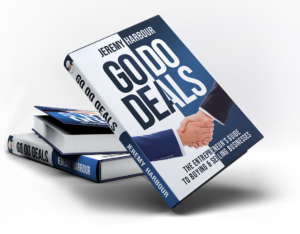Which do you think is more profitable? Creating a business from scratch and then selling it, or buying an established business and then selling it? Previously, we discussed knowing when it is the right time to sell your business. If you aim to transform your wealth and life, your main goal should be to create capital events.
The traditional method of thinking has been that one should launch a business from the ground up, making all the key hires and implementing all the processes that make a business attractive to future buyers. Then, after many years, sometimes after several decades, you sell that business for a big payday. Rather than having one goal of a big capital event right at the end of your career, you should have multiple mini-capital events throughout your career.
A capital event simply means selling a company and its assets to make a profit. You don’t generate wealth running businesses. You generate wealth when you sell them. You need to create these capital events often.
Setting Yourself up for Success
Entrepreneurs aren’t particularly well-prepared for selling businesses. It probably took you years to hone the skill of how you sell your products to customers. The same thing is true when it comes to selling a company. I know you have a three- to five-year plan to sell your business, but trust me, it won’t be three to five years. It never is. So, if you wait fifty years and then try to sell your company, you will have zero experience in selling a company. The first time you sell a company, you’ll learn loads of lessons about how difficult it is to find the buyer and get the deal closed. Invariably, people aren’t successful the first time they do something.
So rather than having all your eggs in a basket that’s extremely high-risk because you don’t have the skillset, why not hone your skillset? Why not learn how to sell businesses?
On the flip side, if you are going to do a start-up every time, you basically waste three years while you’re coming up with names, creating logos, and trying to get your first customer. Like Sisyphus, you will be perpetually pushing a massive rock up a hill. Then you have a period when you can actually build the business and make some money. Then you could sell it. If you’re really good at selling, you’re probably into a five- to ten-year cycle to sell a business.
If you buy a business that’s already pushed the rock up the hill, and now the rock is just gently rolling down the other side, you can do a lot more of these deals. In fact, you can do several a year by buying a business that is already established, making it look much better, and then selling it again.
Capital Events vs. Income
Income is just what you spend. In fact, if you are like most ambitious people, income is probably about 20% less than you spend. Oscar Wilde said that somebody who lived within their means lacked imagination: your lifestyle always adjusts to your income, and you don’t really make any steps forward from a wealth perspective. But when you have a capital event, you can use the capital to generate passive income through investment. You can then start to live on the income from your investment. That means you can now invest all your income.

This is quite different from the advice of most of the books and wealth advisers out there. Most advice is designed around typical employees and having multiple pots. You have one pot for a rainy day, one pot for emergencies, another that you never touch, and a pot that you can touch—all this kind of nonsense. They advise you to save 10% or 15% or 20% of your income, and if you do that, you know you’ll have a million dollars saved by the time you’re 192 years old. I would personally prefer to enjoy my wealth well before my 150th birthday.
So, what percentage of your income should you be saving? You should be saving 100% of your income. The only way you can save 100% of your income is if you’re able to live off the income from your investments.
So, by creating these capital events, you can then deploy this capital into passive investments—real passive investments, not the ones you see advertised on the internet—and use this passive income to live on.
Tim Ferriss, in The 4-Hour Work Week, talked about mini-retirements and taking three to four-month sabbaticals, where you re-energize, re-engage, do something completely different, and then come back and smash your business for a few months. I look at it more from a capital and finance perspective, which is about mini-capital events. You can build the wealth that gives you comfort and control over your finances and puts you in a powerful position.
So, the right time to sell the business is now because you’ll create that capital event that takes all the pressure off. It’s a way for you to grow personally. This provides a much better lifestyle and more security, and financial security leads to making better decisions.
My next blog will be a case study on a Harbour Clubber named Paul. We’ll take a look at how he structured one of his many deals and the lessons he learned along the way—including how not to write a will. Come back next time to learn more from him. Until then, if you would like to find out more about capital events and other key strategies and tactics, pick up a copy of my book, Go Do Deals.
Let’s Connect!
HarbourClubUSA.com
Unity-Group.com



